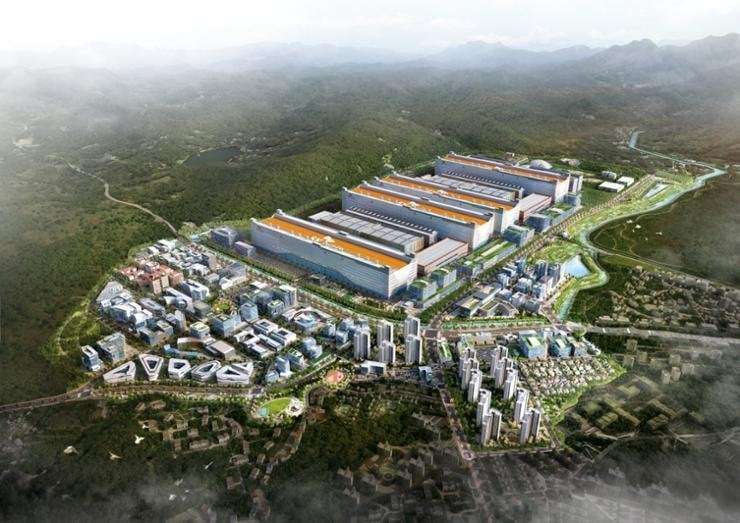Samsung, SK to construct 16 new fabs, generate 3 mil. jobs by 2047
Korea will build the world's biggest semiconductor cluster in Gyeonggi Province by 2047 as Samsung Electronics, SK hynix and other chip companies plan to invest a total of 622 trillion won ($471 billion) to build 16 new fabs, creating more than 3 million jobs, according to the Ministry of Trade, Industry and Energy, Monday.
By expanding the existing mega cluster with 19 production fabs and two research fabs across adjoining cities in the province, the new mega chip cluster spanning 2,102 square meters will produce 7.7 million wafers each month starting in 2030.
The ministry unveiled the plan to bolster the nation's chip industry by providing support for relevant infrastructure and fostering experts in the field. Emphasizing that every country with a sophisticated semiconductor industry is actively seeking global dominance, the focus is on establishing public-private chip clusters.
Inside the new cluster, Samsung Electronics is set to construct six new fabs at a national industrial complex in Yongin, investing 360 trillion won. Additionally, the company plans to establish three fabs in Pyeongtaek with an investment of 120 trillion won and three research fabs at an R&D center in Giheung District at a cost of 20 trillion won. Meanwhile, SK hynix will spend 122 trillion won to build four fabs at another industrial complex in Yongin.
In this joint effort by the industry ministry, the Ministry of Science and ICT and the private chip giants, the new cluster is designed to provide a conducive environment for the production of cutting-edge memory chips, such as high bandwidth memory (HBM) and system semiconductors measuring 2 nanometers or less in size.
The industry ministry said that with the new cluster, the country aims to capture 10 percent of the global system semiconductor market and enhance self-sufficiency in the supply chain of key materials to 50 percent by 2030, up from the current 30 percent.
The ministry said it will make sure the new mega cluster will be supplied with enough electricity and water for operation and benefit from new tax exemptions for certain key chip technologies. Pangyo, where fabless firms are now concentrated, will be the hub of low-powered, high-performance AI chips. Suwon will be a central testbed for compound semiconductors, while Pyeongtaek will see a new semiconductor R&D center open at Korea Advanced Institute of Science and Technology's new campus to be completed by 2029.
"Nuclear power plants in the country will provide stable power supplies to the new chip cluster," President Yoon Suk Yeol said at a townhall meeting announcing the government's plans at Sungkyunkwan University's Natural Science Campus in Suwon. "We are already witnessing overseas investment firms flocking in to explore potential business opportunities associated with the emerging chip cluster. This trend represents a continuation of last year's record-breaking influx of foreign investments into the country."
In tandem with the establishment of the new cluster, the government plans to streamline the national chip research infrastructure currently dispersed across Suwon, Daejeon, and Pohang through an online service named MoaFab. Additionally, the authorities aim to cultivate local talent dedicated to the industry and facilitate the entry of foreign experts into the country by adjusting visa regulations.
The construction of new fabs inside the mega cluster will create 70,000 jobs as well as 40,000 new positions at companies supplying parts and materials. Taking into account additional job-creation effects from the cluster, the ministry said the project will generate employment opportunities for 3.46 million people.
"We will make efforts to see outbound shipments of semiconductors, the country's No. 1 export, reach $120 billion this year," Minister of Trade, Industry and Energy Ahn Duk-geun said. "The new mega cluster's success will further spread to other parts of the nation and become the world's leading chip hub."
Referring to semiconductors as the "backbone of the country's economy" and recognizing their pivotal role in key technologies for AI, digital, communication, quantum, and bio industries, Minister of Science and ICT Lee Jong-ho emphasized that the new cluster will "position the country to surpass others in the industry where ultra-precision technology is crucial."
